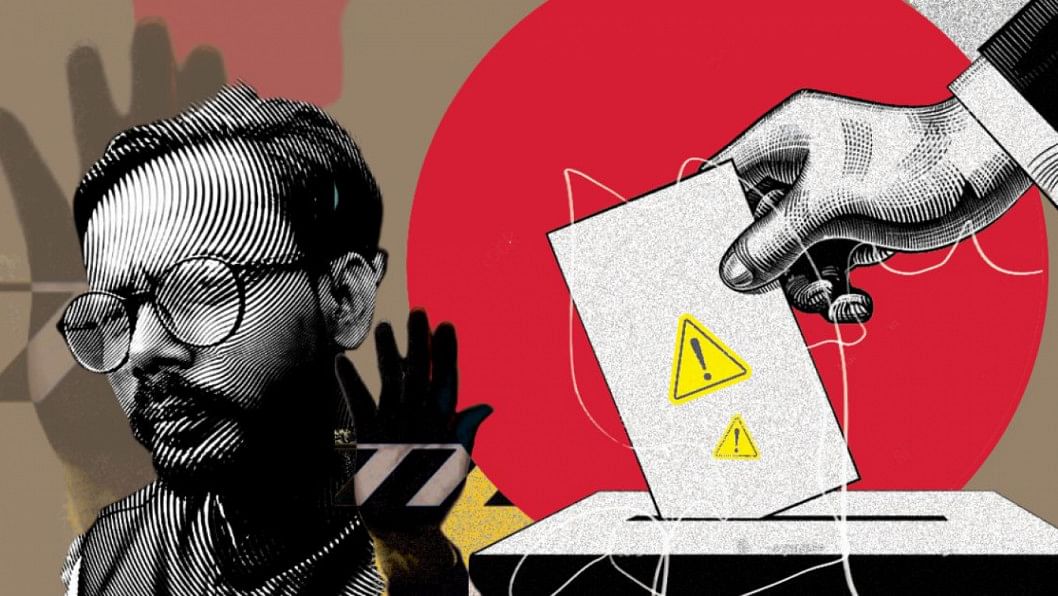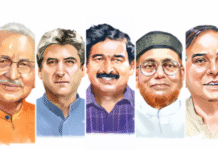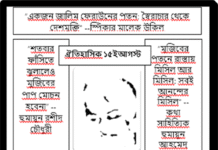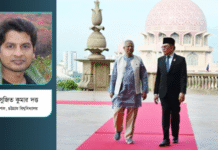
Last update on: Sat Jul 22, 2023 10:31 AM

Just last week, I was telling my students to “learn why the world wags and what wags it.” The excerpt comes from The Once and Future King, TH White’s retelling of the Arthurian saga of a young boy’s transformation into a king under the guidance of magician mentor Merlyn. “Learning is the only thing for you. Look what a lot of things there are to learn,” I quoted White to explain the multifaceted aspects of literary studies at a time when technology and trade have usurped every other branch of knowledge, including creativity. In a world that has lost its innocence, our reading of the world cannot remain innocent. When you see a dog wagging its tail, do not assume the dog is happy or angry; find out who is pampering or threatening that dog. The world has many such wag-the-dog moments. I train my students not to accept presented facts at face value.
We question why MP candidate Ashraful Hossain Alom, better known as Hero Alom, was beaten just before polls closed. The attack on Alom exposes a lot of internal demons troubling our institutional system and society as a whole. This is especially worrying because the government had assured all watchdogs that they would deliver a free and fair election. Months before the national election, the by-election to Dhaka-17 constituency had no real significance. It was more or less a test run for the Election Commission and a warm-up match for the incumbent government. With the main opponents in the tent, Alom can at best be characterised as a bowler you invite for net practice. However, Alom’s rival did not treat him lightly. He was, after all, running as a proxy candidate for the Opposition Parties.
The other reason why Alom became a minefield for his rivals involves the location of the constituency. The political masters who have allowed the income gap to increase over the last 50 years are getting a taste of their own medicine. The so-called tri-state posh area of Dhaka is also home to slum dwellers, who form the support service sector for the upper middle class and the elite class. With his characteristic defiance and desire, Alom became the voice of the voiceless. He was not afraid to challenge the high and mighty, as he had nothing to lose. As someone who turned from a hawker-of-snacks-turned-CD-salesman to a TikTok sensation, he used his position to craftily expose the societal gap.
The allergic reaction to Alom is symptomatic of a culture that deems him a foreign particle in their sociopolitical body. Alom has the ability to stir up controversy by getting under his opponents’ skin. In 2017, The Indian Express ran a story on him when he photoshopped an image to claim that Shahrukh Khan was his biggest fan. He tweeted, “Saarukh Khan fan of me – 100% Hero Alom Bogra…..Hear, Saarukh is taking selfee with me……love you Saarukh my fan.”
Diplomacy is all about avoiding such madness and anger. But the theatricality of Alom unpacked another bout of madness (not without reasons). Now that the attackers have been nabbed, the government is feeling the pinch. The damage is deep-seated. We have pursued a version of democracy that doesn’t like dissent. We have grown in stature without addressing some of our foundational weaknesses.
When the Indian media started trolling Alom for such “audacity,” our police officers roughed him up to “teach” him the meaning of hero. Later, in an attempt to mock the cultural elites, he sang Tagore’s song out of tune. When he decided to vote in two elections in his hometown of Bogura, he continued his battle with the windmill. But for him or his puppeteers, running in an election in a diplomatic zone is arguably the best course of action.
Soon after he and his supporters were escorted out of the polling centre at Banani Bidyaniketan School on polling day, he was attacked by a group of unruly men. The attackers wanted to send one message: Alom was not welcome to join the privy council of politics taken over by high-profile businessmen, bureaucrats, ex-servicemen, and civil society. Gone are the days when a party worker would rise up from the ranks to defend human rights or denounce social injustices. The political bandwagon is now filled with men and women with the benefits of being close to the power circuits. There are some token figures from the grassroots in parliament, all wearing party jerseys.
Hero Alom does not fit the bill. But he served his purpose nonetheless. Alom confirmed that he would not participate in any more elections under this government, echoing others who are already in the streets. There was a tweet from the UN in his support. The State government had a press briefing reiterating their vigilance.
Alom’s explanation of why the West is supporting him is far more intelligent than the slur “moger mulluk” (state of anarchy) that someone in authority used. What wags the Western media is their stated policy of promoting diplomacy as an export item. The country in question had to defend the benefits package it provides to us. Their Congress needs to be aware that the benefits are flowing to nations that support their policies.
Our response should therefore go beyond the oft-cited Vienna Convention. We need to remind our guests that there are some house rules if you want to stay and operate in our country. The realpolitik lies in the way you point out the obvious.
Do you remember the scene from the movie 300 where the Persian envoy offers the Spartan King Leonidas the chance to appease Emperor Xerxes in exchange for a sign of submission? Leonidas throws the messenger into the well as a response, ignoring his last words, “This is blasphemy! This is madness.” “Madness? This is Spartaaa…!” an angry Leonidas retorts.
Diplomacy is all about avoiding such madness and anger. But the theatricality of Alom unpacked another bout of madness (not without reasons). Now that the attackers have been nabbed, the government is feeling the pinch. The damage is deep-seated. We have pursued a version of democracy that doesn’t like dissent. We have grown in stature without addressing some of our foundational weaknesses. A Unicef report from 2022 tells us that only 34 percent of our third-graders achieve the desired literacy skills, while 18 percent attain numeracy skills. Yet, we have a near perfect graduation rate in SSC and HSC exams. We live in a society with inflated figures. Hero Alom can become larger than life because the large majority of his followers are driven by passion and sensation, not reason and education. Conversely, rational and educated ones do not have the sanity to accommodate the voices of dissent and adopt a healthy democracy. In the process, we create a state of anarchy that allows our guests to complain about our dirty laundry in public. And here we ask: why is the laundry dirty to begin with?
Dr Shamsad Mortuza is a professor of English at Dhaka University.









